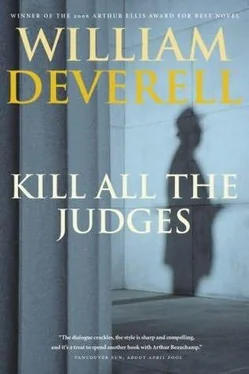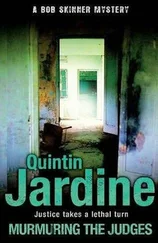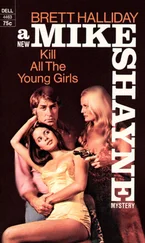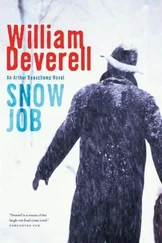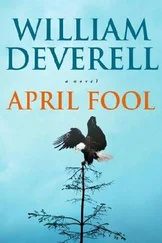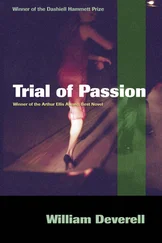William Deverell - Kill All the Judges
Здесь есть возможность читать онлайн «William Deverell - Kill All the Judges» весь текст электронной книги совершенно бесплатно (целиком полную версию без сокращений). В некоторых случаях можно слушать аудио, скачать через торрент в формате fb2 и присутствует краткое содержание. Год выпуска: 2008, ISBN: 2008, Издательство: Random House LLC, Жанр: Криминальный детектив, на английском языке. Описание произведения, (предисловие) а так же отзывы посетителей доступны на портале библиотеки ЛибКат.
- Название:Kill All the Judges
- Автор:
- Издательство:Random House LLC
- Жанр:
- Год:2008
- ISBN:9781551991818
- Рейтинг книги:5 / 5. Голосов: 1
-
Избранное:Добавить в избранное
- Отзывы:
-
Ваша оценка:
- 100
- 1
- 2
- 3
- 4
- 5
Kill All the Judges: краткое содержание, описание и аннотация
Предлагаем к чтению аннотацию, описание, краткое содержание или предисловие (зависит от того, что написал сам автор книги «Kill All the Judges»). Если вы не нашли необходимую информацию о книге — напишите в комментариях, мы постараемся отыскать её.
Kill All the Judges — читать онлайн бесплатно полную книгу (весь текст) целиком
Ниже представлен текст книги, разбитый по страницам. Система сохранения места последней прочитанной страницы, позволяет с удобством читать онлайн бесплатно книгу «Kill All the Judges», без необходимости каждый раз заново искать на чём Вы остановились. Поставьте закладку, и сможете в любой момент перейти на страницу, на которой закончили чтение.
Интервал:
Закладка:
As she patched up some of the holes Arthur poked in Flo’s evidence, a few heads nodded in the jury box. Abigail’s hopes to lasso Florenza had been dashed, but she was determined to leave court with at least one scalp. You couldn’t blame her; no barrister worth her salt wouldn’t covet victory over mighty Beauchamp.
Abigail didn’t waste any time crowing over how the Carlos theory blew up on the defence, and dismissed the political cover-up angle as remote and fanciful. Despite her learned friend’s valiant attempts, none of his “shadowy suspects” had ever taken form.
As to Astrid Leich: “You will recall how coherently her evidence flowed until…well, she had difficulty at the end, but who under the demanding gaze of judge and counsel and jury might not have faltered? Think of the pressure that good, decent woman was under in this tense, crowded courtroom.” Leich had made a little slip, a forgivable lapse, soon corrected.
“Bear closely in mind that the man she first pointed to, Brian Pomeroy, the defendant’s former lawyer, is the very man she saw at 2 Lighthouse Lane only six weeks ago. They are of similar age, and not dissimilar in body proportion, and from fifty metres not vastly dissimilar in features-close enough in hair colour, facial structure, broad foreheads, strong chins.”
Wentworth felt she was making a lot of hay with this. Their noses, he wanted to shout. Look at their noses. Tom Altieri was studying Cud, maybe buying into this, or wanting to. Strong-chinned Cud was slouched there, hungover, brooding.
“The telling fact, and it’s beyond contradiction, is that the accused fled the scene in a stolen car. Why? What would possess an innocent man to rush off in such blind haste? Who runs but the guilty? The cowardly, maybe, but Mr. Brown has demonstrated himself to be anything but that.”
Wentworth didn’t dare another peek at Cud, but this, above all, must have hurt. The thing is, man, I panicked, I turned yellow. Maybe the truth, finally, the unmanly truth. Too late.
“He was intoxicated but obviously not blind drunk. He found the key to the Aston Martin, he drove it from the garage, he made it halfway down the street. Was he sober enough to form the intent to kill? That is the question. Drunkenness is no excuse for homicide but does permit a verdict of manslaughter. And you may be of a mind to consider that verdict.”
So that’s where she was going, not for the throat, no, a high-minded approach, offering a comfortable middle way, tempting the jury with easy compromise. But the jury would not be told that the judge held free rein in sentencing, with life imprisonment the max. Juries aren’t allowed to consider such things.
She ended on a strong note, about how the jury should be proud of themselves for taking part in this great, hallowed, democratic process of the common law.
Eight and a half out of ten.
The boss seemed in no hurry to leave court during the break, instead hung about the prosecutors’ table, offering Abigail a bouquet of compliments, earning a little hug. As Wentworth headed morosely for the door, Haley joined him. “He’s so courteous, even in defeat.” He merely nodded. “Oh, stop being such a grump, Wentworth.”
“Sorry, it’s the tension.”
“I know how to relieve that.”
He was totally uninterested. Find happiness once, and the next time is always better. April hadn’t written him off. That was the one bright spot of his day.
Cud and Felicity joined him on the terrace. “Okay, that’s the crucifixion; I’m ready for the resurrection.” He hugged Felicity. “Rhymes with erection, baby. The jury don’t know the real me, Woodward, that’s what Arthur’s got to work on.”
The boss opened casually, with his standard courtroom jokes, tested over the decades, jury relaxants, he calls them. Then some banter about how, with farm chores stacking up, his wife campaigning, he’d felt bound to take this trial on short notice, and now knew why the first lawyer had a breakdown. Laughter.
He schooled them on the basics, burden of proof, reasonable doubt, the presumption of innocence that remains with the accused through every moment of the trial. A great baritone tremolo as he concluded with a quote from Canada’s highest court: “‘If the presumption of innocence is the golden thread of criminal justice, then proof beyond a reasonable doubt is the silver, and these two threads are forever intertwined in the fabric of criminal law.’”
Then he made a show of abandoning a folio of notes on the table-I don’t need these, was the message-and strolled toward the jury to talk from the heart. It was the old Beauchamp, the master, one of his best, maybe just a step below the McHugh case, the rogue chiropractor.
He made what hay he could over the scandal-Whynet-Moir and the justice minister-telling the jury they must be mindful that someone may have desperately wished to stop Whynet-Moir’s mouth, to hush up “what we now know has become an explosive political scandal.”
That got Kroop into it. “You’re in danger of transgressing, Mr. Beauchamp.”
The judge remained obsessive about refusing to hear the word bribe , stubbornly holding onto his early, ill-thought-out ruling. That didn’t deter Arthur, who hammered away at the possibilities: a hired assassin, or someone with a grudge against Whynet-Moir, or someone whose freedom or reputation was at stake, someone who brokered the multi-million-dollar payout-this with a fierce look at Shawn Hamilton, who remained poker-faced under the jury’s gaze.
Arthur deftly handled Astrid Leich, reminding the jury of her confident fingering of Brian Pomeroy. This is the man. Said twice, emphatically. Having made a completely wrong identification of Brian Pomeroy- “Mr. Brown’s former lawyer , for goodness sake”-how could her second choice be relied on even in the remotest degree? “Especially after, during a break, my flustered friends for the Crown persuaded her to attempt a last-minute patch job as a means of saving face.”
Blaming it not on the sweet soul who erred but on the prosecutors, implying they leaned on her hard. Pretty crafty. Nudged the line, but you do what you have to in a tight case.
“Let us dispel any notion that the issue of manslaughter is of any consequence whatsoever. You can’t get there, my friends, without being satisfied to a moral certainty and beyond any reasonable doubt-that, as His Lordship will tell you, is the unswerving rule that must guide you-that my client was the assailant.”
He moved down the aisle, a fatherly hand on Cud’s shoulder. “Cudworth Brown, who runs the recycling depot on Garibaldi Island, a blunt-talking working man with a bad back, raised in a hardrock mining town, a former steelworker, active in his union, who gave every cent he earned to support his impoverished parents, a poet who writes of love and truth and beauty-often intemperate in manner, yes, as poets often are, lustful, yes, and easily led. But where’s the crime in that? Cudworth Brown had done harm to no man or woman. And then one day-” striding back to the jury, voice rising, “-he was chosen to be a victim of a diabolical scheme, seduced into a spiderweb of deceit and trickery. A web woven by the black widow of 2 Lighthouse Lane.”
Wentworth felt a shiver wiggle up his spine, the room silent but for an errant cough.
“And who was her aide-de-camp? Her true lover, her only true lover, handsome, dashing Carlos Espinoza. You’ve seen his photo-compare him with this rough-hewn fellow in the third row, with his slightly off-kilter nose: an honest, plain mug to be sure, but it hasn’t won him any beauty pageants.”
This drew smiles from the jury, particularly from the Steelworkers guy, who obviously liked the way Arthur was portraying Cud as a good old-fashioned union guy with human faults.
Читать дальшеИнтервал:
Закладка:
Похожие книги на «Kill All the Judges»
Представляем Вашему вниманию похожие книги на «Kill All the Judges» списком для выбора. Мы отобрали схожую по названию и смыслу литературу в надежде предоставить читателям больше вариантов отыскать новые, интересные, ещё непрочитанные произведения.
Обсуждение, отзывы о книге «Kill All the Judges» и просто собственные мнения читателей. Оставьте ваши комментарии, напишите, что Вы думаете о произведении, его смысле или главных героях. Укажите что конкретно понравилось, а что нет, и почему Вы так считаете.
